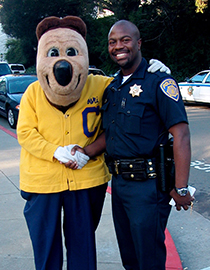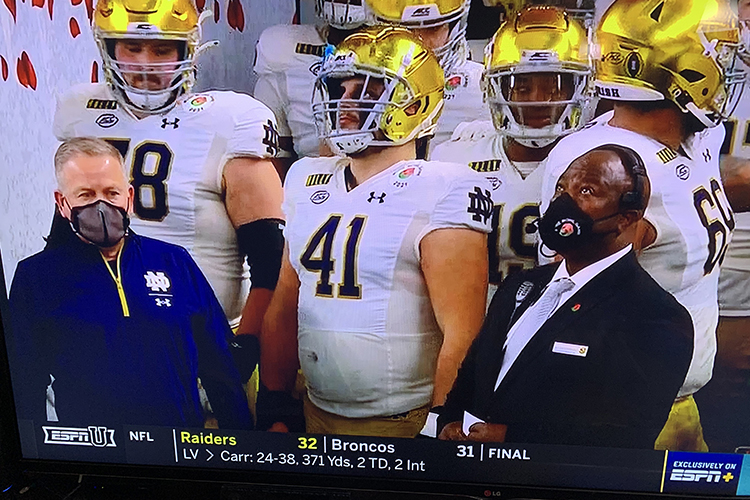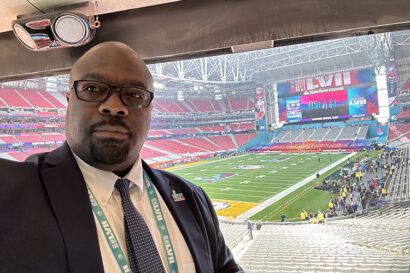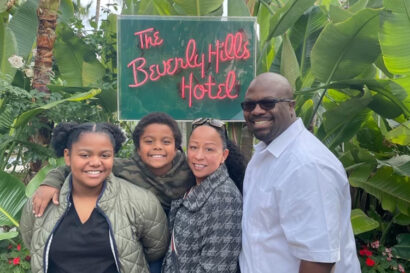Thirty years and 100 flights: This graduate says it was worth the journey
He walked away a few courses shy of his degree at UC Berkeley. Life's detours — and his frequent flier status — have brought him back to graduate at last
May 11, 2023

Hatcher Parnell nearly graduated in 1996 before, as he put it, “life happened.” While he walked away from his sociology degree, Parnell found success on Berkeley’s campus and, later, at the University of Southern California. After a year of multiple flights weekly to Berkeley, Parnell will finally finish what he started three decades ago. (UC Berkeley photo by Julian Meyn)
There are super-commuters who drive for hours in bumper-to-bumper traffic. Living far from where they work or go to school, they plan their lives around rush hours and delays.
Then, there’s Hatcher Parnell.
Twice a week, Parnell rises before 5 a.m. in Whittier, about 25 miles east of downtown Los Angeles. He takes a quick shower, hops in his car and drives 35 minutes to the Long Beach airport. He breezes through TSA precheck and, with coveted “A group” boarding status, claims a seat near the front of the morning Southwest Airlines flight bound for Oakland.
Parnell knocks out some course readings on the 45-minute flight before dashing off the plane and subjecting himself to the mercy of BART. If all goes according to plan, he steps onto the UC Berkeley campus just in time for his 10 a.m. discussion section on the future of nuclear energy.
“It’s a sprint,” Parnell said. “I use every minute.”
When — if — things are on time, he gets back home to his wife and two children around 10 p.m.
It’s a grueling academic arrangement, even by super-commuter standards. But for Parnell, who turned 50 in April, it’s a welcome opportunity to close a chapter of his life that he started writing three decades ago.
In the spring of 1996, Parnell was majoring in sociology and had just a handful of courses remaining by May’s commencement. He planned to wrap up those courses in the ensuing months — a plan that allowed him to walk in the spring ceremony. Those lingering credits were as good as done, he figured. He was so confident he would finish, he donned his regalia and posed for photos outside Zellerbach Hall.

Left to right: Brothers Terry, Leon and Hatcher Parnell and their father, Hatcher Parnell in June, 1996. (Photo courtesy Hatcher Parnell)
Then, he said, money got tight and work took priority over textbooks.
“Life happened,” Parnell said. “I walked away, and I never looked back.”
Parnell didn’t go far, at least in a literal sense. While he didn’t have his degree, Parnell spent the next decade immersed in jobs that made him an integral part of university life. He coordinated events for Cal Athletics and, later, patrolled the streets as a UC Berkeley police officer. He went on to accept a high-stakes position with the University of Southern California (USC), working for the college equivalent of the Secret Service.
Despite a resumé stacked with successes, a pang of embarrassment over his missing degree increasingly haunted Parnell. Waves of insecurity occasionally washed over him, perhaps most intensely when he hired interns half his age, some with master’s degrees.
No more. Twenty-seven years after posing for graduation photos and with the finish line in sight, Parnell will graduate on May 19 from Berkeley with his degree in sociology. It wasn’t remotely on the table a year ago, he says. But supporters spanning the state and a dose of determination are finally bringing a close to Parnell’s Berkeley story.
“I’ve been fortunate to have a position where I have a tremendous support structure around me that allows me to do this,” Parnell said. “I’ll be forever grateful for it.”

“Berkeley shaped me,” said Hatcher Parnell, who will graduate with his sociology degree. (UC Berkeley photo by Julian Meyn)
‘Surviving was goal No. 1’
Parnell was the first in his family to attend college. He walked onto the Cal football team in 1991, but he quickly learned that life as a student-athlete wasn’t for him. Still, he remained drawn to sports, so he picked up part-time jobs working at the campus Recreational Sports Facility and later assisting with game-day operations for the Oakland Athletics and the Oakland Raiders.
“Whatever I could do to make money,” he said. “Just surviving was goal No. 1.”
Parnell muscled through his coursework until May 1996, when, like thousands of college students each year, he was forced to shift his attention and energy to paying the bills. The degree would have to wait.
Instead of textbooks, he picked up work as an event manager at Cal Athletics, but that short-term post kick-started his career. He worked that job for eight years, a stretch of time during which his financial situation stabilized.
He could have returned to his unfinished coursework. “But,” he said, “I was comfortable.”

(Photo courtesy Hatcher Parnell)
By 2005, after years of working alongside UC Berkeley police officers coordinating football game-day operations, Parnell became interested in working as one. He remembers a rapid-fire series of chance encounters with top brass at the UCPD one afternoon and rushing home with an application packet. In a matter of weeks, he was in the Alameda County Sheriff’s Office Academy in Dublin, where his focus shifted to surviving the grueling series of physical training drills. In his mid-30s, he was the fourth-oldest person among the mostly early-20s recruits — those older than him gradually dropped out, and he resolved to stick with the training.
It was, in a way, also Parnell’s first brush with being a nontraditional student.
He thrived in the academy and soon began patrolling and investigating crimes around campus. His job was to create a sense of community and to protect the campus. He knew the place well after five years as a student and eight as an employee. Faculty and staff recognized him.
“They referred to me as the mayor of UC Berkeley,” he said.
Still, it was paradoxical, being such a part of a vaunted academic institution without having completed a degree. He generally shoved aside those insecurities and focused on the work, conducting stings for backpack thieves who prowled campus libraries or responding to the occasional SWAT call to protect the campus community — his campus community.
The work was rewarding. But the 5 p.m. to 3 a.m. shifts were unforgiving. Parnell and his wife, Patty, were raising their first child by then, but the couple felt like ships passing in the night. At times, he said, she felt like a single parent.

(Photo courtesy Hatcher Parnell)
Their situation, he said, “was very taxing.”
Those stresses made it easy to change gears in 2010 when, after five years with the police department, Parnell’s longtime friend who’d been working at USC called and said a job might be opening up in the athletics department. They needed an assistant athletic director, and the friend thought Parnell was perfect for the job.
Leaving Berkeley would be difficult — his friends and work experiences had been here. But returning to Los Angeles, where he grew up and where his family still lived, would be a gift, he thought. So would a more reasonable work schedule and increased family time.
Within weeks, he accepted the job.
Spearheading USC game-day operations. Orchestrating security for championship sporting events. Parnell’s job became the kind of exciting work he could see himself happily doing for another decade. But then, a USC leader drew up plans that would catapult him into a new position and lead him to finish what he’d started at Berkeley.

Hatcher Parnell assisted with game day operations at the Rose Bowl in 2021. The game was moved to Texas because of the COVID-19 pandemic. (Photo courtesy Hatcher Parnell)
‘He checked all the boxes’
Like many major universities, USC has a substantial number of high-profile politicos and events and students with famous parents, not to mention the occasional controversial speaker.
Security for these individuals and events historically had been handled by campus police. But last year, USC leaders created a separate executive protection division to take on this work.
Given Parnell’s work history, he fit the bill to direct the Office of Executive Protection Services.
“He checked all of the boxes,” said Erroll Southers, associate senior vice president for safety and risk assurance at USC. “He has a way of making sure that everything is taken care of. He’s very methodical. He’s very organized. He’s got an incredible personality, gets along with everybody.

Hatcher Parnell provided contract security work for the NFL during Super Bowl LVII in Arizona. (Photo courtesy Hatcher Parnell)
“If you’re going to work dignitary protection, that’s the kind of person you need to have there.”
Parnell was flattered by the offer. But he remembered having doubts, too.
“I was very up-front,” Parnell said, explaining what he told USC: “Look, I’m a little bit short of my degree.”
Southers told Parnell that finishing the degree would be worth it in the long run. And to help him make it work, Southers added that he would help Parnell flex his USC work schedule.
“Literally, right after that conversation,” Parnell said, “I was on the phone trying to figure out what I needed to do to get back into Cal.”
Phone trees, transcripts and … microfiche?
Parnell spent hours on the phone and on registrar websites, scrambling to unearth old transcripts and course catalogs, an at-times fraught attempt to learn how many credits he had remaining and how difficult it would be to regain entry to Berkeley. In his corner, though, was a network of connections he’d made from 15 years on Berkeley’s campus — people who could steer him through the tangled web of course transfers and equivalencies.
At one point, Berkeley officials needed to know whether he’d satisfied the foreign language requirement — a detail listed only on his Los Angeles Unified High School transcript from the early 1990s. Parnell discovered that the school’s researchers would need to pore through microfiche rolls to find it.

Hatcher Parnell with his wife, Patty, and their two children, Ellie and Sean. (Photo courtesy Hatcher Parnell)
He feared it would be a months-long quest; luckily, it took just a few weeks.
There were other concerns. Classrooms had changed drastically since Parnell had sat at a desk. Online platforms like Canvas didn’t exist then, and neither did weekly online discussion boards and virtual classrooms. To ease back into academics, he enlisted in a class at Berkeley City College for credits that he knew would transfer. It was a valuable step, Parnell said. Without that course, he thinks he might have been overwhelmed at Berkeley.
As for physically stepping back on campus? He said it felt like coming home.
“At the end of the day, Berkeley shaped me. I am who I am because of this place, and I wouldn’t trade that.”
– Hatcher Parnell
There were jarring moments, however. Parnell was more than twice the age of many of his classmates. That took some getting used to, but the wisdom he’d gained with age gave him a deeper appreciation for the material he was learning. Classmates in his Economy and Society course were barely old enough to remember the 2008 financial crisis, but Parnell had lived it.
“I could tell you exactly what happened (during that crisis) and what people were feeling,” he said. “I saw it.”
Professor Neil Fligstein taught that course and said the perspective Parnell brought to discussions was invaluable. He called Parnell’s trajectory “truly inspiring.”
“That he came back to school to complete his degree shows an amazing amount of internal fortitude,” Fligstein said. “He told me more than once that the class had helped him understand many of the things that had happened in his life. I am pleased that he will finish his degree. What an accomplishment!”

Hatcher Parnell’s final classes at UC Berkeley included discussions about historic events — ones that he lived through. (UC Berkeley photo by Julian Meyn)
A message to his younger self? Take it seriously.
Parnell’s renewed interest in learning was apparent to Patty, too. Even after a marathon day of travel, work and studying, he’d come home excited — something she attributed to a degree of wisdom accompanying age. He has spent evenings at the dining room table, studying for an exam — not unlike his 13-year-old daughter and 8-year-old son.
“When you’re young, you go (to school) because you want to finish it,” she said. “That’s it. But when you are older, you dig deeper into the classes, into the knowledge.”

Right to left: Hatcher, Patty, and their son, Sean, and daughter, Ellie. (Photo courtesy Hatcher Parnell)
It’s taken Hatcher Parnell upward of 100 airline flights to get to the brink of graduation. He’ll take one more plane next week when, on May 19, he will don his regalia for the Department of Sociology’s graduation ceremony.
A few new faces that weren’t in his life 27 years ago will be in the audience. Among them will be Southers, the supervisor who encouraged him to finish his degree.
“I knew he could do it,” Southers said. “I just think he needed the opportunity.”
Patty will be there, too. Their daughter’s eighth-grade grad night trip is the same day, however, making for some fraught discussions about who will be where.
Looking back, Parnell’s message to his younger self would be to take his studies more seriously. Rather than simply beating the drum of school being important, he’d explain why. And he’d say that it’s OK to not go to the largest university right off the bat — that it’s OK to work up to that.
As for regrets? Not in the slightest.
“At the end of the day, Berkeley shaped me,” said Parnell, who will continue working his high-stakes post at USC. “I am who I am because of this place, and I wouldn’t trade that.”

While it was jarring for Hatcher Parnell to immerse himself in coursework after so long away from his studies, stepping back on campus felt like coming home. (UC Berkeley photo by Julian Meyn)